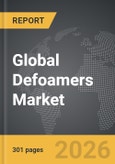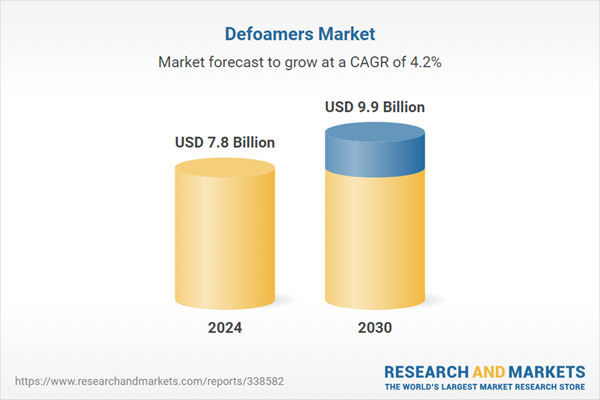Global Defoamers Market - Key Trends & Drivers Summarized
What Are Defoamers and Why Are They Important?
Defoamers, also known as anti-foaming agents, are chemical additives used to reduce or eliminate foam formation in industrial processes and products. Foam can hinder manufacturing efficiency, affect product quality, and cause operational issues, making defoamers essential in various industries. Defoamers work by breaking down the surface tension of foam bubbles, causing them to collapse and preventing new foam formation. They are widely used in industries such as pulp and paper, water treatment, paints and coatings, food and beverage, and pharmaceuticals. The ability of defoamers to enhance process efficiency, improve product quality, and prevent operational disruptions underscores their significance in industrial applications.How Are Defoamers Utilized in Different Industries?
The applications of defoamers span multiple industries, reflecting their importance in maintaining operational efficiency and product quality. In the pulp and paper industry, defoamers are used to control foam during paper production, ensuring smooth operation and high-quality paper products. The water treatment industry relies on defoamers to prevent foam formation in wastewater treatment plants, enhancing treatment efficiency and water quality. In the paints and coatings industry, defoamers are added to formulations to prevent foam during mixing and application, ensuring a smooth finish and optimal performance. The food and beverage industry uses food-grade defoamers to control foam in processes such as fermentation, ensuring product consistency and quality. Additionally, defoamers are used in the pharmaceutical industry to prevent foam in drug formulations and manufacturing processes. These diverse applications highlight the critical role of defoamers in supporting various industrial processes and end-products.What Are the Environmental and Health Considerations?
The production and use of defoamers involve environmental and health considerations that must be addressed to ensure safety and sustainability. Defoamers are generally formulated to be non-toxic and safe for use in various applications, but the selection of appropriate defoaming agents is crucial to prevent any adverse effects. The environmental impact of defoamers depends on their chemical composition and biodegradability. Industries are increasingly adopting eco-friendly and biodegradable defoamers to minimize environmental pollution and ensure compliance with regulatory standards. Proper handling and disposal of defoamers are essential to prevent contamination of water bodies and soil. Regulatory frameworks and international standards are being enforced to ensure the safe production, usage, and disposal of defoamers, promoting responsible manufacturing and environmental stewardship.What Is Driving the Growth in the Defoamers Market?
The growth in the defoamers market is driven by several factors, including increasing demand in end-use industries, technological advancements, and evolving regulatory landscapes. The growth of the pulp and paper industry, driven by increasing demand for packaging and paper products, is a major driver for defoamers consumption. The expanding water treatment industry, necessitated by the need for efficient wastewater management and water purification, is boosting the demand for defoamers. Technological advancements in defoamer formulations have enhanced their efficiency, compatibility, and environmental friendliness, making them more competitive in the market. Additionally, regulatory measures promoting environmental protection and product safety are shaping the market landscape, encouraging the adoption of sustainable and responsible practices. These drivers highlight the dynamic and evolving nature of the defoamers market, emphasizing the balance between industrial demands and environmental sustainability.Report Scope
The report analyzes the Defoamers market, presented in terms of market value (US$ Thousand). The analysis covers the key segments and geographic regions outlined below.- Segments: Product Type (Water-based, Oil-based, Silicone-based, Other Product Types); Application (Pulp & Paper, Coatings, Water Treatment, Agrochemicals, Food & Beverages, Other Applications).
- Geographic Regions/Countries:World; United States; Canada; Japan; China; Europe (France; Germany; Italy; United Kingdom; Spain; Russia; and Rest of Europe); Asia-Pacific (Australia; India; South Korea; and Rest of Asia-Pacific); Latin America (Argentina; Brazil; Mexico; and Rest of Latin America); Middle East (Iran; Israel; Saudi Arabia; United Arab Emirates; and Rest of Middle East); and Africa.
Key Insights:
- Market Growth: Understand the significant growth trajectory of the Water-based Defoamers segment, which is expected to reach US$3.8 Billion by 2030 with a CAGR of a 4.1%. The Oil-based Defoamers segment is also set to grow at 4.3% CAGR over the analysis period.
- Regional Analysis: Gain insights into the U.S. market, valued at $2.1 Billion in 2024, and China, forecasted to grow at an impressive 7% CAGR to reach $2.1 Billion by 2030. Discover growth trends in other key regions, including Japan, Canada, Germany, and the Asia-Pacific.
Why You Should Buy This Report:
- Detailed Market Analysis: Access a thorough analysis of the Global Defoamers Market, covering all major geographic regions and market segments.
- Competitive Insights: Get an overview of the competitive landscape, including the market presence of major players across different geographies.
- Future Trends and Drivers: Understand the key trends and drivers shaping the future of the Global Defoamers Market.
- Actionable Insights: Benefit from actionable insights that can help you identify new revenue opportunities and make strategic business decisions.
Key Questions Answered:
- How is the Global Defoamers Market expected to evolve by 2030?
- What are the main drivers and restraints affecting the market?
- Which market segments will grow the most over the forecast period?
- How will market shares for different regions and segments change by 2030?
- Who are the leading players in the market, and what are their prospects?
Report Features:
- Comprehensive Market Data: Independent analysis of annual sales and market forecasts in US$ Million from 2024 to 2030.
- In-Depth Regional Analysis: Detailed insights into key markets, including the U.S., China, Japan, Canada, Europe, Asia-Pacific, Latin America, Middle East, and Africa.
- Company Profiles: Coverage of players such as Ashland Global Holdings Inc., BASF SE, Clariant, Dow Inc., Elementis and more.
- Complimentary Updates: Receive free report updates for one year to keep you informed of the latest market developments.
Some of the 52 companies featured in this Defoamers market report include:
- Ashland Global Holdings Inc.
- BASF SE
- Clariant
- Dow Inc.
- Elementis
- Elkem Silicones
- Evonik Industries
- Kemira Oyj
- Munzing Chemie GmbH
- Solenis
- Wacker Chemie AG
This edition integrates the latest global trade and economic shifts into comprehensive market analysis. Key updates include:
- Tariff and Trade Impact: Insights into global tariff negotiations across 180+ countries, with analysis of supply chain turbulence, sourcing disruptions, and geographic realignment. Special focus on 2025 as a pivotal year for trade tensions, including updated perspectives on the Trump-era tariffs.
- Adjusted Forecasts and Analytics: Revised global and regional market forecasts through 2030, incorporating tariff effects, economic uncertainty, and structural changes in globalization. Includes historical analysis from 2015 to 2023.
- Strategic Market Dynamics: Evaluation of revised market prospects, regional outlooks, and key economic indicators such as population and urbanization trends.
- Innovation & Technology Trends: Latest developments in product and process innovation, emerging technologies, and key industry drivers shaping the competitive landscape.
- Competitive Intelligence: Updated global market share estimates for 2025, competitive positioning of major players (Strong/Active/Niche/Trivial), and refined focus on leading global brands and core players.
- Expert Insight & Commentary: Strategic analysis from economists, trade experts, and domain specialists to contextualize market shifts and identify emerging opportunities.
Table of Contents
Companies Mentioned (Partial List)
A selection of companies mentioned in this report includes, but is not limited to:
- Ashland Global Holdings Inc.
- BASF SE
- Clariant
- Dow Inc.
- Elementis
- Elkem Silicones
- Evonik Industries
- Kemira Oyj
- Munzing Chemie GmbH
- Solenis
- Wacker Chemie AG
Table Information
| Report Attribute | Details |
|---|---|
| No. of Pages | 301 |
| Published | February 2026 |
| Forecast Period | 2024 - 2030 |
| Estimated Market Value ( USD | $ 7.8 Billion |
| Forecasted Market Value ( USD | $ 9.9 Billion |
| Compound Annual Growth Rate | 4.2% |
| Regions Covered | Global |









